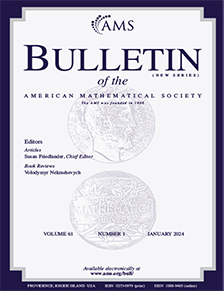Bulletin of the American Mathematical Society
The Bulletin publishes expository articles on contemporary mathematical research, written in a way that gives insight to mathematicians who may not be experts in the particular topic. The Bulletin also publishes reviews of selected books in mathematics and short articles in the Mathematical Perspectives section, both by invitation only.
ISSN 1088-9485 (online) ISSN 0273-0979
(print)
The 2020 MCQ for Bulletin of the American Mathematical Society is 0.84.
What is MCQ? The Mathematical Citation Quotient (MCQ) measures journal impact by looking at citations over a five-year period.
Subscribers to MathSciNet may click through for more detailed information.


